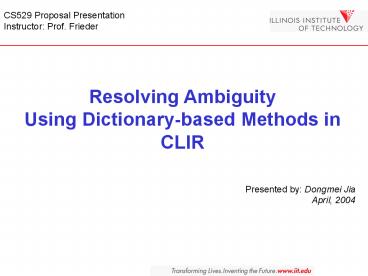Clustering - PowerPoint PPT Presentation
1 / 12
Title:
Clustering
Description:
Dictionary-based Methods ... Dictionary-based methods for cross- lingual information ... Querying across languages: A dictionary-based approach to multilingual ... – PowerPoint PPT presentation
Number of Views:68
Avg rating:3.0/5.0
Title: Clustering
1
CS529 Proposal Presentation Instructor Prof.
Frieder
Resolving Ambiguity Using Dictionary-based
Methods in CLIR
Presented by Dongmei
Jia
April, 2004
2
Dictionary-based Methods
- Dictionaries used in CLIR Bilingual machine
readable dictionaries (MRD) - One biggest issue Ambiguity happens in query
translation - caused by addition of extraneous terms to
query - failure to translate
technical terms - failure to translate
phrases or translate them poorly
3
Resolving Ambiguity
- Query expansion via local feedback applied in
papers Dictionary-based methods for cross-
lingual information retrieval - Resolving Ambiguity for Cross-Language
Retrieval - A method by which a query is modified by the
addition of terms found in docs known to be
relevant to the query - Assume top retrieved documents are relevant
- Include Pre-translation and Post-translation
- --- theres one problem
4
Problem 1 Statement
- Some initial query terms may only have one
translation while other terms may have many
translations in the target language - When trying to retrieve documents by using the
kind of translated query, we may not get the
real relevant docs. - Then applying query expansion techniques, the
effectiveness may not get improved, or even
decreased
5
TREC Example
- TREC topic example
- Number 441
- Lyme disease
- Description
- How do you prevent and treat Lyme disease?
- Term Lyme may have only one translation in
the bilingual dictionary, but terms prevent,
treat and so on may have bunch of meanings. - Lyme is a more important query term --
search key
6
Proposed Strategy 1
- Give query terms different weights
- Increase the weight of the search keys which
have only few translations. Always they are the
most important words of a query, and vice versa - In relevance feedback, rank the retrieved docs
based on not only tfidf, but also the weights of
query terms. - The top N terms got for query expansion
should be reduce ambiguity more effectively
7
Problem 2 Statement
- In the same paper, it said combining pre- and
post-translation expansion is most effective and
improves precision and recall - However, they only examined a single language
pair English to Spanish, and relied on the
Collinss English-Spanish electronic dictionary - Problem specific technical query terms rarely
can be translated in the general dictionary. It
will cause ambiguity.
8
Proposed Approach 2
- Use some technical dictionaries with the general
one - Cons
- it can translate unique terms which were not
found in general dictionaries - The terms of special dictionary are often
unambiguous - The same TREC example term Lyme may only occur
in the medical dictionary, but may not occur in
the general one.
9
Further Disambiguation
- Co-occurrence Statistic Model can be used to do
phrase translation with phrase MRD - it may reduce ambiguity by inferring the
correct translation of phrases which were not
translated via the phrase dictionary
10
Test Environment
- It may consist of
- TREC Cross-language topics, documents
- A general MRD for English-Spanish translation
- One or more technical MRDs for English-Spanish
translation - A phrase English-Spanish dictionary
- A retrieval system, i.e. INQUERY
11
Evaluation
- Compare avg precisions at different recall for
WBW (baseline) / query expansion/query expansion
with weighting strategy / monolingual (best case)
- Compare avg precision at different recall for WBW
using only general bilingual MRD (baseline) /
general MRD with technical MRD / general MRD with
technical MRD and phrase MRD / general MRD with
technical MRD, phrase MRD and Co-occurrence /
monolingual (best case)
12
Reference
- Lisa Ballesteros and W. Bruce Croft.
Dictionary-based methods for cross- lingual
information retrieval Proceedings of the 7th
International DEXA Conference on Database and
Expert Systems Applications - David A. Hull and Gregory Grefenstette. Querying
across languages A dictionary-based approach to
multilingual information retrieval Proceedings
of the 19th International Conference on Research
and development in Information Retrieval, page
49-57, 1996 - L. Ballesteros, W.B. Croft, Resolving Ambiguity
for Cross-Language Retrieval Proceedings of ACM
SIGIR, 64-71, 1998. - M. Aljlayl and O. Frieder, "Effective
Arabic-English Cross-Language Information
Retrieval via Machine Readable Dictionaries and
Machine Translation," - M. Aljlayl, O. Frieder, and D. Grossman, On
Bidirectional English-Arabic Search, Journal of
the American Society of Information Science and
Technology, 53(13), November 2002. - Lisa Ballesteros and W. Bruce Croft. Phrasal
translation and query expansion techniques for
cross-language information retrieval. - Leah S. Larkey and Margaret E. Connell.
Structured Queries, Language Modeling, and
Relevance Modeling in Cross-Language Information
Retrieval - David A. Grossman and Ophir Frieder. Information
Retrieval Algorithms and Heuristics































